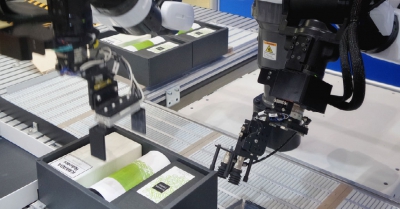A £1.4m project aimed at boosting the uptake of robots in small and medium-sized manufacturing will investigate ways to more easily change, adapt and repurpose automated systems.
Most robots used in industry are highly specialised, making them expensive and difficult to quickly respond to new tasks.
This has limited their adoption, especially in small and medium-sized enterprises (SMEs) who depend on their agility to be competitive in a dynamic global market.
The UK has also seen significantly less use of robots compared to other industrial nations, only catching up to the global average of 85 robots per 10,000 employees in 2019 and still less than one-tenth of the adoption of other leading nations, such as Korea and Singapore.
In response, a new business model known as Robotics-as-a-Service (RaaS) is emerging that allows companies to pay a small fee to lease robotic devices – and services such as maintenance – rather than having to pay large upfront capital costs to buy systems outright.
Now, a new £1.4m project from Loughborough University, funded by the Engineering and Physical Sciences Research Council (EPSRC), is aiming to significantly improve the ease with which robots are hired, deployed, maintained, and adapted.
Dr Niels Lohse, director of Loughborough Intelligent Automation Centre who will lead the three-year initiative, called Industrial Robots-as-a-Service (IRaaS) – Resilient and responsive manufacturing systems enabled by rapidly deployable mobile robots said:
Robots-as-a-Service (RaaS) is an emerging business model where robots are provided on-loan, with much of the operating responsibility (programming, monitoring and maintenance) undertaken by the RaaS provider.
This makes adoption of automation more viable for SMEs and for manufacturers working in dynamic markets. However, RaaS has primarily seen adoption in logistics and warehouse applications where robots are easiest to deploy.
By comparison, manufacturing equipment is highly specialised and integrated to enable high throughput and efficiency. This results in long commissioning times, high investment levels and the long-term burden of maintaining complicated bespoke equipment, all of which make RaaS more challenging.
For IRaaS to be achievable it must be both affordable, capable, and sustainable. This is most easily achieved by replacing dedicated and static industrial robots with flexible, low-cost robots that are simple to deploy and repurpose, while collaborating to achieve the same goals.
The project will be delivered by a multidisciplinary team from three individually excellent research groups: The Intelligent Automation Centre (LU-IAC), the Centre for Autonomous Systems (LU-CAS) and the Engineering Systems of Systems group (LU-ESoS), all based at Loughborough University.
For the latest on our region, subscribe to Midlands Matters, the official newsletter of the Midlands Engine.




